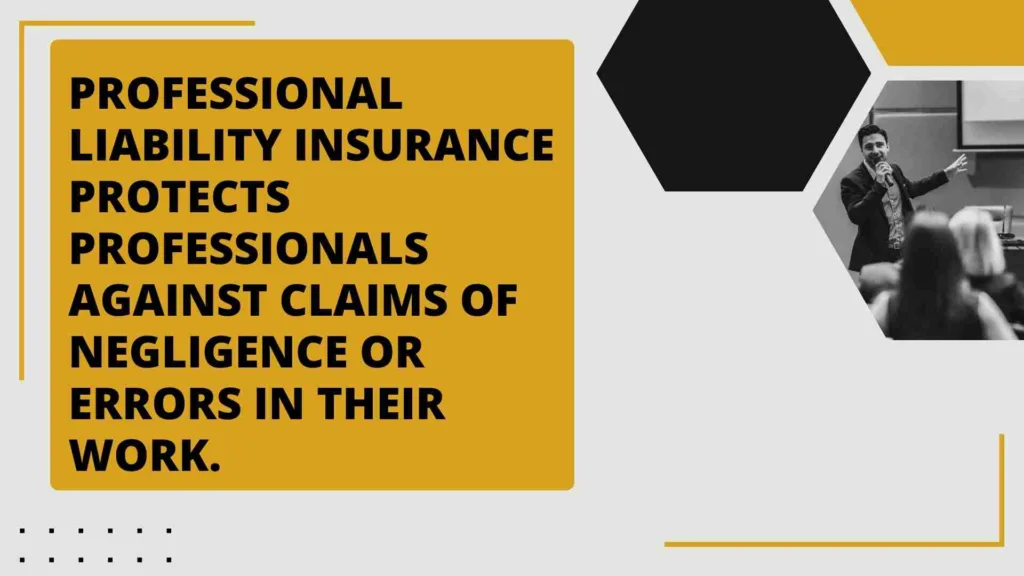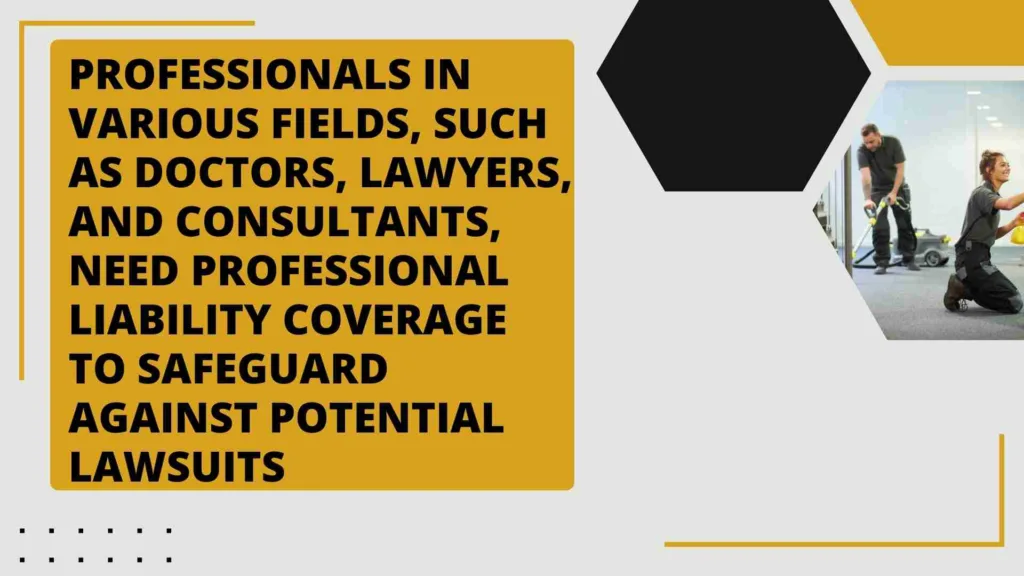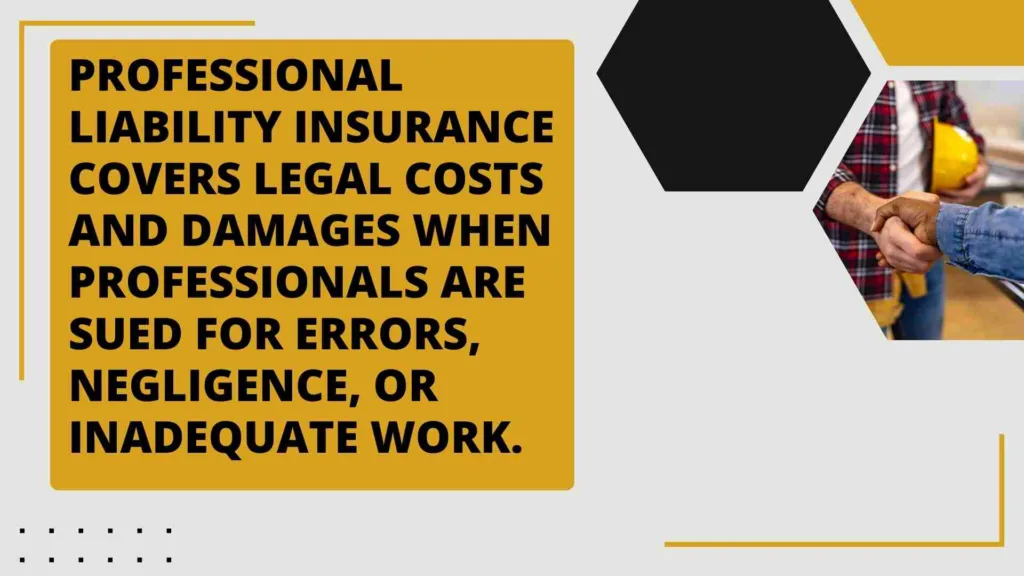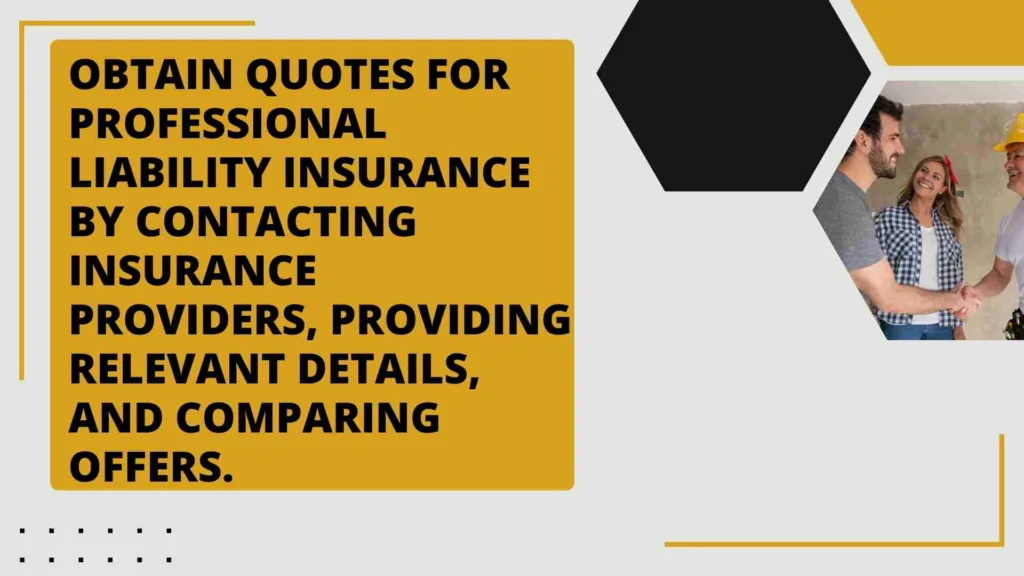Professional liability insurance, also known as errors and omissions insurance or malpractice insurance, is a critical coverage many businesses need to protect themselves. This type of insurance can help cover negligence claims or failure to perform professional services.
Read on to learn about professional liability insurance, who needs it, what it covers, why you need professional Liability Insurance, and why it’s so important for businesses today.
In This Article:
- What is Professional Liability Insurance?
- Who Needs Professional Liability Coverage?
- What Does Professional Liability Insurance Cover?
- Key Differences Between General Liability and Professional Liability
- Why is Professional Liability Insurance Important?
- What Happens Without Proper Coverage?
- How Much Does Professional Liability Insurance Cost?
- How to Get a Quote for Professional Liability Insurance
- FAQs About Professional Liability Insurance
What is Professional Liability Insurance?

Professional liability insurance is an error and omission policy that helps protect businesses and individuals against negligence claims and lawsuits. It covers the costs of defending against allegations of professional mistakes or failing to perform services.
For example, if you own an accounting firm and are sued for providing inaccurate tax advice, your professional liability insurance could cover legal fees and any settlements or judgments. Without this type of insurance, you’d be responsible for these costs.
Professional liability insurance may also be called malpractice insurance in professions like healthcare and law. But many other businesses can benefit from this type of coverage too. It protects against financial losses that can result from professional errors and omissions.
Who Needs Professional Liability Coverage?

Many types of businesses and professionals should consider carrying professional liability insurance. Some examples include:
- Consultants
- Accountants
- Architects
- Engineers
- Real estate agents
- Therapists
- Financial advisors
- Lawyers
- Doctors
- Nurses
Essentially any individual or company that provides clients with professional advice, services, designs, or consultation needs liability protection. If your business services put you in a position where clients could sue you for mistakes, you need coverage.
Even home-based and online businesses need to consider professional liability insurance today. For example, web designers, social media consultants, and virtual assistants can all benefit from this type of insurance.
Do contractors need professional liability insurance?
Contractors may require professional liability insurance to safeguard them from financial damages resulting from claims of negligent professional advice. Professional liability insurance, or errors and omissions (E&O) insurance, covers claims and lawsuits related to work mistakes.
This policy protects a contractor facing a lawsuit due to a professional mistake, such as missing a construction project deadline. Contractor and construction errors, like deviations from blueprints, can have severe financial consequences for the client, potentially leading to lawsuits against the contractor’s business to recover losses.
Professional liability insurance can be crucial for contractors, shielding them from allegations of negligence or errors.
It is important to emphasize that California mandates general contractors to carry a surety bond and general liability insurance. These types of insurance protect the contractor’s business from claims related to property damage, bodily injury, and personal injury.
In most cases, commercial leases also require businesses to maintain general liability insurance. Besides professional liability insurance, contractors may need commercial auto insurance to safeguard their vehicles and contractor’s tools and equipment insurance to protect their construction equipment.
Contractors’ professional liability insurance (CPL insurance) is purchased by contractors offering design and building services. It covers mistakes made by the contractor and errors made by third parties hired by the contractor, such as engineers, architects, and other vendors.
Larger contractors that provide these services in-house have the potential for greater profits but also expose themselves to more risk. CPL insurance is designed to protect contractors from these risks when they handle most of the construction duties themselves.
This type of insurance safeguards contractors from errors occurring during the design and engineering process, which is especially beneficial when multiple professionals are involved in different aspects of the project.
In conclusion, contractors should meticulously review client contracts and state laws to determine insurance coverage to safeguard their business and assets. Insurance costs for construction companies and contractors depend on factors such as the nature of their work, the size of their business, and the level of risk involved.
While professional liability insurance offers protection against accusations of work errors, it is not comprehensive. Contractors should also consider other policies, such as general liability insurance, to cover expenses related to property damage, bodily injury, and personal injury.
What Does Professional Liability Insurance Cover?

Professional liability insurance policies cover defense costs, settlements, and judgments associated with claims alleging your professional negligence. Some key things covered can include:
- Legal fees to defend against covered allegations
- Settlement amounts if a lawsuit is lost
- Court-ordered damage awards if found liable
- Costs associated with redoing faulty work
Professional liability insurance can also cover related expenses like loss of reputation and lost wages during litigation. The coverage depends on your policy, the limits chosen, and the insurer. But in general, this type of insurance is designed to protect your business from financial harm due to professional errors and omissions.
It’s important to understand that professional liability insurance does not cover bodily injury or property damage. For that, you need general liability insurance. Professional liability coverage is focused on financial and reputational harm only.
Key Differences Between General Liability and Professional Liability
General liability insurance and professional liability insurance protect against different types of claims:
General liability insurance covers bodily injury, property damage, personal injury, and advertising injury claims. This protects you if someone gets hurt on your property or you damage someone else’s property.
Professional liability insurance covers claims alleging your professional negligence – meaning you made mistakes, errors, or omissions that harmed a client financially.
To be fully protected, many businesses need general and professional liability coverage. General liability won’t cover professional services claims. And professional liability won’t cover bodily injury or property damage claims. Working with an insurance agent can help you determine what coverage your particular business needs.
Why is Professional Liability Insurance Important?
There are several key reasons why professionals need liability insurance coverage:
1. It provides vital financial protection.
Defending yourself against a negligence lawsuit can cost tens of thousands or more. Professional liability insurance transfers these financial risks off your shoulders. Without coverage, just one claim could devastate your business finances.
2. Many clients require you to carry it.
Most businesses that hire consultants, accountants, architects, and other professionals will require proof of your errors and omissions insurance. Clients want the reassurance that you’re properly insured.
3. It gives clients peace of mind.
Knowing you have professional liability insurance gives clients confidence in using your services. It shows them you’re a true professional covered against mistakes. This can provide a competitive advantage for your business.
4. Your state licensing board can require it.
In many professions like law, medicine, accounting, and real estate, having E&O coverage is mandatory. It’s a condition of holding a professional license in these fields.
5. Insurance can help defend even frivolous suits.
Even if a claim against you is frivolous or fraudulent, your liability insurer will hire legal counsel and build a defense against the allegations. This protection is invaluable.
6. Your business depends on your reputation.
Even if you win, being sued for professional mistakes can damage your reputation. Professional liability insurance helps minimize reputational harm from allegations.
For all these reasons, professional liability coverage is a must-have for many businesses today. The risks and financial consequences of going without it are simply too great.
What Happens Without Proper Coverage?
Choosing to go without E&O insurance can be extremely risky. Here are some of the potential consequences:
- You’ll be personally responsible for covering all legal fees and damages that could rise into millions of dollars. Only some businesses can afford this.
- You may need to declare bankruptcy if found liable for a large professional negligence judgment.
- Future earnings can be garnished to pay off legal judgments and settlements.
- You may need insurance backing you to retain qualified legal counsel.
- Major damage to your business’s reputation can result.
- Clients may leave you to work with insured competitors.
- You may need help to obtain the necessary business licenses.
- Your business could end up folding after just one uncovered claim.
Having this coverage in place is vital for any business providing professional services. The risks of going without it are too great in today’s increasingly litigious business environment.
How Much Does Professional Liability Insurance Cost?
Professional liability insurance costs vary widely based on your profession, annual revenue, years in business, limits chosen, and other factors. Typically, annual premiums can range from:
- $500 – $1,500 for solo professionals
- $2,000 – $5,000 for small businesses
- $8,000 – $25,000 for mid-sized businesses
- Over $100,000 for large firms
As you can see, costs increase as your business grows and the risks increase. Higher coverage limits also mean higher premiums. However, investing in adequate coverage is far less costly than paying legal fees and damages out-of-pocket after an uncovered professional mistake claim.
Working with an independent insurance agent or broker is the best way to get quotes tailored to your unique business. They can shop multiple professional liability carriers and options to find you the best value available.
How to Get a Quote for Professional Liability Insurance

Getting quotes for professional liability insurance involves providing details about your business. Here are some tips for getting accurate premium estimates:
- Work with an insurance agent or broker to shop multiple carriers and get you the best deal. Avoid relying on direct insurance company websites only.
- Be prepared to provide information about your profession, years in business, revenue, clients, projects, subcontractors, licenses, claims history, and more.
- Ask about discounts such as association memberships, continuing education, multiple policies with one insurer, clean claims history, etc.
- Consider higher deductibles to reduce premium costs if cash flow permits. But don’t go too high.
- Discuss needed coverage limits with your agent based on your business size and the kinds of clients. Refrain from underinsuring.
- Request sample policy forms to understand definitions, exclusions, provisions for retroactive coverage, and other details.
- Learn when premiums are typically due – often 50% at policy inception and 50% at renewal.
- Shop new quotes every 1-2 years as the market changes. Loyalty often doesn’t pay off.
Getting affordable professional liability insurance requires doing your homework. But the coverage is well worth the effort and cost of its protection.
Frequently Asked Questions
What is the difference between errors and omissions vs malpractice insurance?
These terms are largely interchangeable. Malpractice coverage refers to professional liability policies for client-focused occupations like doctors, lawyers, accountants, and engineers. Errors and omissions is a broader term encompassing IT professionals, consultants, insurance agents, and more.
Does my LLC need professional liability insurance?
Limited liability companies (LLCs) still need coverage even though your personal assets are protected. An LLC itself can still be sued for damages. And lawsuits against your business can harm its value and reputation. Professional liability insurance protects the company itself.
What happens if I get sued without liability insurance?
Going bare leaves you 100% exposed to pay for your legal defense and any damages awarded by a court. Most businesses cannot afford this risk. It may lead to bankruptcy or damage your finances, credit, and reputation.
Can I get by with just general liability coverage?
No – general liability policies explicitly exclude coverage for professional services. They cover bodily injury and property damage only. For professional or service-based businesses, professional liability coverage is a must-have.
Does professional liability cover intellectual property infringement?
Not directly. Specific media liability insurance policies best cover intellectual property issues like copyright and trademark infringement. Some professional liability plans may offer some protection against IP claims.
Am I protected under my employee benefits liability policy?
Employee benefits policies only cover administration errors in employee benefit plans – not your general professional services. Separate professional liability insurance should still be secured.
What are common exclusions on professional liability policies?
Standard exclusions include criminal acts, contractual liabilities, pollution incidents, war, bodily injury/property damage, and claims covered under other policies you carry. Exclusions can vary by insurer.
Why do I need professional liability insurance?
Professional liability insurance, or errors and omissions insurance, is essential for businesses that provide professional services or advice. It protects you and your business from claims of negligence, errors, or omissions arising from your professional activities.
What is the coverage provided by professional liability insurance?
Professional liability insurance typically covers legal fees, court costs, and damages awarded in a covered claim. It helps protect your business from financial loss and can provide peace of mind.
Who requires professional liability insurance?
Any business or professional who provides services or advice to clients can benefit from professional liability insurance. This includes but is not limited to consultants, contractors, doctors, lawyers, accountants, architects, and engineers.
What types of businesses are covered by professional liability insurance?
Professional liability insurance is available for many businesses, including healthcare professionals, IT consultants, financial advisors, real estate agents, etc. Checking with insurance companies to verify if your specific business is covered is important.
How does professional liability insurance differ from general liability insurance?
General liability insurance covers bodily injury and property damage claims, while professional liability insurance focuses on professional services, advice, or negligence claims. If your business provides professional services, having both types of insurance is important to ensure comprehensive coverage.
What is the cost of professional liability insurance?
The cost of professional liability insurance varies depending on factors such as the type of business, coverage limits, and location. Obtaining insurance quotes from multiple companies is recommended to compare prices and coverage options.
Can professional liability insurance help protect against cyber liability?
Some professional liability insurance policies offer coverage for cyber liability, which can help protect your business against data breaches, cyberattacks, and other cybersecurity risks. Reviewing the policy details to understand the extent of coverage is important.
Is professional liability insurance the same as medical malpractice insurance?
No, professional liability and medical malpractice insurance are separate policies. Medical malpractice insurance specifically covers healthcare professionals for claims of negligence or errors in providing medical care, while professional liability insurance can cover a broader range of professions.
How can professional liability insurance help my business?
Professional liability insurance can help protect your business from financial loss due to claims of professional negligence, errors, or omissions. It can cover legal expenses and damages awarded in a covered claim, safeguarding your business’s financial stability and reputation.
What is the difference between professional liability insurance and business insurance?
Business insurance typically includes a variety of coverage types, such as general liability, property insurance, and commercial auto insurance. Professional liability insurance is a specific type of business insurance that focuses on claims related to professional services or advice. It provides coverage that may not be included in a general business insurance policy.
The Bottom Line
Professional liability insurance protects a wide range of businesses that provide client services. It helps defend against potentially catastrophic claims alleging your professional negligence.
Going bare exposes your business to financial and reputational risks that most companies cannot afford. Work with a qualified insurance advisor to explore your specific coverage needs, get quotes, and secure this critical protection. Proper professional liability insurance allows you to run your business more confidently by managing your risks. These are the reasons why you need Professional Liability Insurance.
Key Takeaways
- Professional liability insurance covers negligence claims against your business for professional errors or omissions. It helps pay legal costs and damages.
- Many businesses, including consultants, accountants, architects, engineers, real estate agents, therapists, and lawyers, need this coverage.
- Professional liability insurance covers financial losses like legal fees, settlements, and court judgments related to professional mistakes.
- It differs from general liability insurance, which covers bodily injury, property damage, and personal injury claims. Many businesses need both types.
- Going without professional liability insurance is risky and can lead to bankruptcy if faced with an uncovered claim.
- Costs vary by profession, revenue size, limits, and other factors but typically range from $500 for solos to over $100,000 annually for large firms.
- Work with an insurance broker or agent to get quotes from multiple providers and ensure you get the right policy for your business.
- Professional liability insurance can give clients confidence in your services and help protect your business reputation.
Reference Lists
- ProfessionalsCoverage. (n.d.). Who Needs Professional Liability Insurance? Retrieved from https://www.professionalscoverage.ca/who-needs-professional-liability-insurance/
- Insurance Information Institute. (2010). Insurance Handbook. Retrieved from https://www.iii.org/sites/default/files/docs/pdf/Insurance_Handbook_20103.pdf
- Kemper. (n.d.). Resources – Kemper. Retrieved from https://www.kemper.com/my-policy/resources
- Kemper. (n.d.). Kemper Life Insurance Coverage. Retrieved from https://www.kemper.com/explore-products/life
- Does M&S Do Car Insurance? A Full Guide In 2024 - April 15, 2024
- Pet Insurance for Older Dogs: 2024 Full Guide & Top Providers - March 17, 2024
- Small Business Equipment Breakdown Insurance: Full Coverage - November 6, 2023

